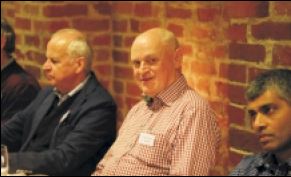
The Danish Shortwave Club
International
 |
Anker Petersen at the meeting to dissolve the DSWCI
which took place at the Kalundborg radio station in 2016
(Photo: Jonathan Marks) |
In memoriam Anker Petersen
The
long-standing chairman of the Danish Shortwave Club International (DSWCI), the
world-renowned and respected wave hunter Anker Petersen, has died.
Anker
Petersen was born in Sorø on May 7, 1941 and graduated from Sorø Academy in
1959. He made a career in the Danish military and held the rank of lieutenant
colonel in the Danish Air Force until his retirement at the age of 60 in 2001.
He held the rank of colonel during missions abroad, including at Ramstein Air
Base in Germany. Anker was frustrated to retire so early because he felt a lot
of knowledge was being lost. From 1966, he lived in a bungalow at Udbyvej in
Skovlunde.
Anker had
been an active wave hunter since August 1957 and became a member of the Danish
Shortwave Club (which shortly afterwards changed its name to Danish Shortwave
Club International - DSWCI). One of his classmates was Kaj Bredahl Jørgensen,
who also started DXing at the same time. The two had a close friendship until
Kaj's death in April 2022.
Anker was
chairman of the DSWCI from 1963 to 1972 and again from 1981 until the
dissolution of the DSWCI in 2016. He was a diligent contributor to the club
magazine "Shortwave News". He and Kaj Bredahl were the main people responsible
for the DSWCI's great international success. At its peak, the DSWCI had more
than 800 members, 85 percent from outside Denmark - spread across 45 countries
around the world. From 1971, the club magazine was published in English only.
In 1967,
the Norwegian Ellman Ellingsen from the DX Listeners Club suggested founding an
association of European DX clubs and Anker supported this idea. The European DX
Council (EDXC) was founded by 10 DXers in his house in Skovlunde on June 4,
1967, and Anker himself became the first Secretary General of the association, however
for a few months only. But he continued to be active for the EDXC in the
following years. In 1995, the annual EDXC conference was organized jointly by
the DSWCI and the DDXLK and Anker was one of the four coordinators. He attended
the EDXC conferences almost every year; the last time was in 2017 in Finland.
He himself said that he was too ill to participate in the following
conferences.
From
November 5, 1967 to December 28, 1969 Anker and several members of the DSWCI -
together with the then well-known disc jockey Christian Flagstad - created a
weekly DX program for the shortwave program of the Danish broadcaster Radio
Denmark. At Anker's suggestion, the program was called "DX-Window".
It was a great success and was only discontinued because Radio Denmark discontinued
shortwave broadcasts in English (and Spanish) at the end of 1967. The name
"DX-Window" was also used for a newsletter published by the DSWCI for
a year as a supplement to Shortwave News*.
Anker's
main interest in DXing were the tropical bands - the 120, 90, 75 and 60 meter bands
in the frequency range between 2300 and 5700 kHz. He carefully observed which
stations were active on the tropical bands by checking a number of sources,
including specialist magazines from all over the world. Since 1973, he produced
the serious and thoroughly researched "Tropical Bands Survey" every
year. In 1998, this annual publication was renamed the "Domestic Broadcasting
Survey" (DBS) and now included - in addition to all active stations on the
tropical bands - domestic stations on the other shortwave bands. The latest
edition of DBS was published at the end of March 2024.
Each month,
Anker also compiled a tropical bands monitor with information about which
stations could be heard on the tropical bands that month. The last list was
compiled on June 1, 2024. Due to his failing health, he had to discontinue his
work.
Anker was a
passionate collector of QSL cards. He had received virtually every country in
the world and got confirmation by a QSL card. In his opinion, his most valuable
QSL came from Radio Western Highlands (2450 kHz), Papua New Guinea. He got this
confirmation of reception on his birthday in 1975.
In addition
to DXing, his hobbies included birds and stamps, not to mention traveling. Especially
after his retirement, he traveled to numerous countries around the globe - not
least to Asia and the Caribbean.
In 2007,
his good friend Claes W. Englund (who passed away in 2014) described Anker
Petersen in an article in "Eter-Aktuellt" as "modest in his
personal appearance, but dynamic and a great enthusiast in the DX hobby. He
continues to work selflessly for us DXers".
Anker Petersen died on September 2,
2024 at the age of 83 at the hospital in Herlev. He was buried in a common
grave at Skovvejens Kirkegård cemetery in Ballerup on September 18. He had
never been married and had no children. He had no heirs. The only relative was
a cousin in Tune.
Anker's entire, unique and extensive
collection of DX magazines, books, lists etc. was lost as it was of no interest
to his cousin. When the news of his death became known in DX circles, the house
on Udbyvej in Skovlunde had long since been emptied. The auctioneer who had
cleared the house had not disposed of everything, but had decided to save the
collection of QSLs. Members of the Dansk DX Lytter Klub (DDXLK) managed to save
this unique collection of QSLs and thus preserve it for posterity. The idea is
to donate the collection to a radio museum.
Anker's death became known to DXers
around the world on October 23, 2024 when the executor of his estate, a Copenhagen
law firm, contacted the German-language "Radio-Kurier" to cancel
Anker's subscription to the magazine.
Stig Hartvig Nielsen, DX Focus 11/2024
ADDX Radio-Kurier 12/2024
* The name "DX
Window" was later used for a printed newsletter from October 1987 to
September 1994. From February 1996 to May 1999 "DX Window" was
published on the Internet. From May 2001 to December 2016, "DX
Window" was edited bi-weekly by Anker Petersen and sent out by e-mail.

